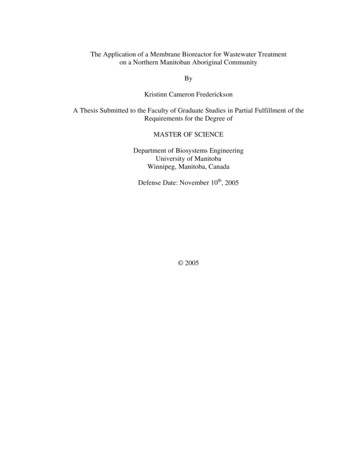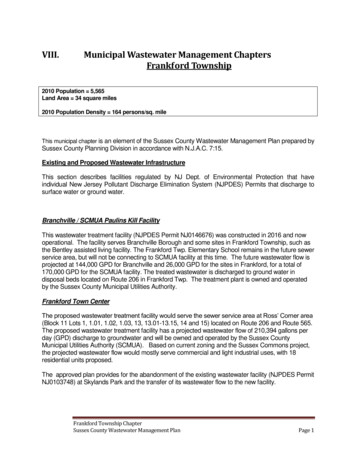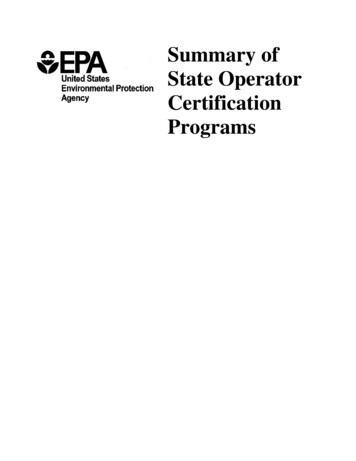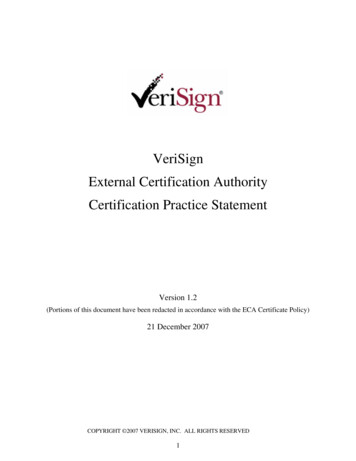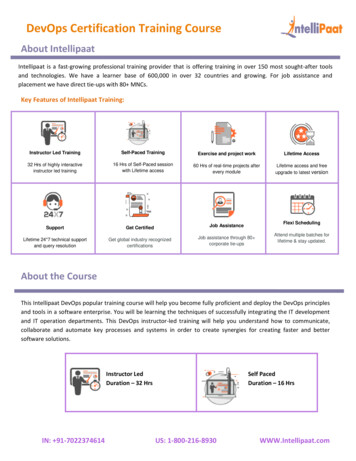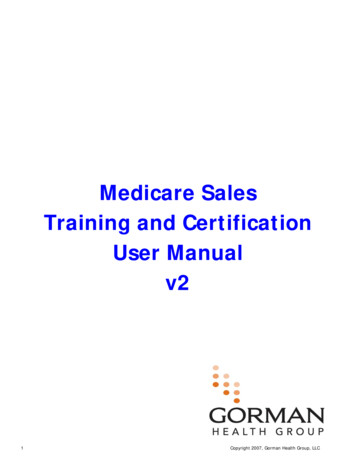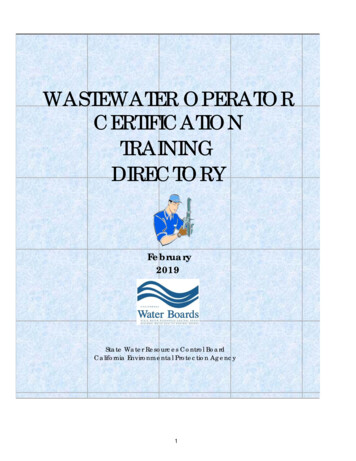
Transcription
WASTEWATER State Water Resources Control BoardCalifornia Environmental Protection Agency1
Introduction . 4Educational Points vs. Semester Units . 5Educational Point Substitution for Experience . 6Acceptable High School Diplomas . 7Acceptable High School Diploma Equivalents . 7Community Colleges . 7Universities . 7Associations, Organizations, and Education Companies offering Courses, Classes or SeminarCoursework . 8Operator Certification Requirements Table .10Community Colleges Offering Wastewater Certificate or Degree Programs 11College of the Canyons 11Cuyamaca College. 11Folsom Lake College – Los Rios Community College District . 11Imperial Valley College . 12Los Angeles Trade-Technical College . 12Mt. San Jacinto College . 12Palomar College . 13Santa Barbara City College. 13Santa Rosa City College . 13Santiago Canyon College . 14Shasta College . 14Solano Community College. 14Ventura College . 15Castro Valley Adult & Career Education . 15Community Colleges Offering One or More Wastewater Courses . 16Bakersfield College . 16College of the Sequoias . 16Merced College . 16Sacramento City College . 16San Bernardino Valley College . 16Universities and Schools Offering Wastewater Training or Technology Courses . 17Office of Water Programs California State University, Sacramento. 17Companies Offering Wastewater Training . 17American Water College . 17CEU Plan . 17OCT Water Quality Academy . 172
WasteWater Technology Trainers . 17Wastewater Associations . 18California Water Environment Associations (CWEA) . 18California Rural Water Association . 18Water Environment Federation . 183
IntroductionWhat Is In This Directory?This guide provides an overview of the educational requirements contained in both theWater Code, Division 7, Water Quality, Chapter 9 Waste Water Treatment PlantClassification and Operator Certification and the California Code of Regulations Title 23,Chapter 26, Division 3, and lists opportunities to satisfy those requirements.H hat Is The State Water Board Authority?WWater Code, Division 7, Chapter 9, Section 13629 authorizes the State Water ResourcesControl Board (State Water Board) and the Wastewater Operator Certification Program(WWOCP) to approve courses of instruction at higher educational institutions. The sectionalso gives the WWOCP authority to approve courses of instruction given by professionalassociations, nonprofit or for-profit private or public agencies, and educational companies ifthey are equivalent to courses of instruction given by higher educational institutions. Uponrequest, the WWOCP will assign educational points to approved courses.California Code of Regulations Title 23, Chapter 26, Division 3, Sections 3685-3687,specify the education requirements and set out the method used by the State Water Boardto calculate educational points.Why Is Training So Critical?The State Water Board, WWOCP certifies all operators of wastewater treatment plants withthe primary goal of protecting public health and the environment by ensuring that alloperators are trained in operating wastewater treatment plants. In California, allprospective wastewater treatment plant operators must demonstrate to the WWOCP thatthey have successfully taken technical training.In fact, before an applicant is even all owed to take an examination, they must document theirtraining by sending official or copies of official college transcripts, diplomas or trainingcertificates to the WWOCP. For more information, please visit our website at:http://www.waterboards.ca.gov/water issues/programs/operator certification/operatorcertification.shtml. Depending on grade level, prospective operators must have specificlevels of training. In some cases, this means college classes; in others it means seminars orin-house programs. Several grades have more than one possible path to satisfy therequirements.4
What Are The Requirements?Please refer to the “OPERATOR CERTIFICATION REQUIREMENTS TABLE” on page sixfor a list of education and experience requirements for Grades I through V. There is aneducational requirement to both take the Examinations and to qualify for Certifications.NOTE: Applicants must take and pass the WWOCP Examination before applying forCertification.Educational Points vs. Semester UnitsEducational Points are automatically allotted to non-college/university coursework(continuing education, association coursework, etc.) Additionally, if an applicant submits lessthan 60 semester (or equivalent quarter) units of college/university coursework and less than15 semester units were earned in biology, chemistry, wastewater treatment, engineering,math or physics, the semester or quarter units will automatically be converted to educationalpoints. Please note that all college/university coursework must be completed at anaccredited college or university. Educational Points cannot be converted into Associate’sdegree or Bachelor degree educational status. College and university courses completed ona quarter system are prorated to semester units.California Code of Regulations Title 23, Chapter 26, Division 3, Section 3685 of the regulationsauthorizes the State Water Board to grant educational points as follows:(a) Pursuant to the provisions of this article, applicants may be required to obtaineducational points to qualify for certification. Operators may receive educational pointsfor completing wastewater treatment, biology, chemistry, engineering, math, or physicscourses as follows:(1)One three-unit semester course completed as part of the curriculum of an accreditedcollege or university is equal to eight educational points. Operators who havecompleted courses that result in more or less than three units or in quarter units ratherthan semester units shall be credited with educational points on a prorated basis.(2)Each hour of instruction given by a professional association, private/public agency, oreducation company is equal to one tenth of an educational point (.1); ten hours ofinstruction is equivalent to one educational point.(b) At Grades III, IV, and V, operators may earn up to a maximum of sixteen educationalpoints for completing management courses. An operator may not earn more than foureducational points for each management category. The management categories are: oralcommunication, technical writing, public administration, business management, andfinance.5
Educational points for a management coursework may be earned as follows:(1) One completed two-unit semester course (or any course worth more than two semesteror three-quarter units) that is part of the curriculum of an accredited college or universityis equal to four educational points.(2) Each hour of instruction taught at a professional association, private/public agency, oreducation company is equal to one half of an educational point; it takes twenty hours ofinstruction to equal one educational point.(c) Applicants may not substitute experience for educational points.The chart below may be useful when converting units to educational points:Units (Semesters)123456Units (Quarter) 12 weeks123456Educational Points2.55.58.010.513.516.0Educational Points1.53.55.57.09.010.5Educational Point Substitution for ExperienceApplicants may substitute 16 educational points for one year of experience; however,educational points cannot be used to substitute the 1,800 hours (or one year) of OperatorIn-Training (OIT) experience. In other words, operators must work one year or 1,800 hoursprior to being able to substitute educational points for experience. An applicant must retainthe minimum educational points to qualify for their Grade level and have at least sixteenadditional educational points available to substitute.For example, a Grade II applicant with one year of experience and at least 28 educationalpoints would be eligible to substitute 16 educational points for one year of experience. Theapplicant would have 12 points to satisfy the education requirement and 16 points tosubstitute for one year of experience. (28-16 12)Once the 16 points are used to substitute for experience, they cannot be used again tosubstitute for experience at another grade level or qualify for a certification examination.Operators can substitute 16 educational points for one year of experience multiple times.6
Acceptable High School DiplomasPhotocopies of high school diplomas and/or transcripts are acceptable. If submitting atranscript, it must be a copy of an official copy and clearly state the graduation date, theapplicant’s name, and the name of the high school. If applicants do not have a copy oftheir diploma or it has been misplaced, contact the high school or school district directlyfor a copy.Acceptable High School Diploma EquivalentsHere is a list of acceptable high school diploma equivalents: General Educational Development Test (GED, administered by the GED Testing ServiceGEDTS). High School Equivalency Test (HisSET administered by ETS educational TestingService). Test Assessing Secondary Completion (TASC administered by McGraw-Hill). The California High School Proficiency Examination (CHSPE) issued by the State ofCalifornia Board of Education.Community CollegesCommunity colleges that offer certificate programs in wastewater are listed on pages 10 to14. Community colleges offering only a few wastewater courses are listed separately onpage 15. The prospective wastewater treatment plant operator should not confusecommunity college certification with certification by the WWOCP. A typical communitycollege certification program requires the student to complete a program of study totalingapproximately 23 semester units in wastewater and related topics. Certification by the Stateof California requires the qualified individual to pass an examination administered by theState Water Board, meet the experience and educational minimum requirements andsubmit a certification application with the applicable fee.Even though a community college in your area may not be listed in this document, it isrecommended that you inquire directly with your local college. Wastewater programs arein a continual state of change. Demand for courses and budget constraints often dictatescheduled offerings.UniversitiesThere are a few universities which offer correspondence coursework that includeswastewater manuals and online programs. These programs provide an excellent alternativefor those individuals who are unable to attend a college or cannot find such courses offeredin their vicinity.The curriculum covers a variety of topics including tours of pre-treatment andwastewater treatment facilities. Contact the universities listed in the directory formore information.7
Associations, Organizations, and Education Companies offering Courses, Classesor Seminar CourseworkThere are various regional and statewide training organizations, and educationalcompanies which provide wastewater training seminars, courses and classes. When acourse has been completed, submit a copy of the certificate of completion that includes thename of the instructor and attendee, the course title, how many minutes or hours the coursetook, and a signature from the course instructor. Please note that the list of Associationsand Organizations is not comprehensive nor does the WWOCP endorse any specificeducational entity.Where To Go For More Information?For additional information, please contact:Wastewater Operator Certification ProgramState Water Resources Control BoardP.O. Box 944212Sacramento, CA 94244-2120(916) 341-5819http://www.waterboards.ca.gov/water issues/programs/operator certification/operator cer tification.shtml8
OPERATOR CERTIFICATION REQUIREMENTS TABLE(Effective April 1, 2013)Note: Applicants must take and pass the Office of Operator Certification WastewaterTreatment Plant Operator Examination before applying for Certification.PATHEXAMINATION EDUCATIONCERTIFICATIONREQUIREMENTSQUALIFYING EXPERIENCEREQUIREMENTSGRADE I1High school diploma or equivalent and 6 andeducational points1 year of full-time qualifyingexperienceHigh school diploma or equivalent and 9 andeducational points18 months of full-time qualifyingexperience as a Grade I operator2High school diploma or equivalent and 12 andeducational points2 years of full-time qualifyingexperience3Associate’s degree, a higher degree, ora minimum of 60 college semester units,including a minimum of 15 semesterunits of science courses1 year of full-time qualifyingexperienceGRADE II1GRADE III1andHigh school diploma or equivalent and 12 andeducational points3 years of full-time qualifyingexperience as a Grade IIoperator2High school diploma or equivalent and 18 andeducational points4 years of full-time qualifyingexperience3Associate’s degree or a minimum of 60college semester units, including aminimum of 15 semester units ofscience coursesand2 years of full-time qualifyingexperience4Bachelor’s degree or a higher degree,including a minimum of 30 semesterunits of science coursesand1 year of full-time qualifyingexperience9
GRADE IV1High school diploma or equivalent and 32 andeducational points6 years of full-time qualifyingexperience2Associate’s degree or a minimum of 60college semester units, including aminimum of 15 semester units ofscience coursesand4 years of full-time qualifyingexperience3Bachelor’s degree or a higher degree,including a minimum of 30 semesterunits of science coursesand3 years of full-time qualifyingexperience4Valid registration as a chemical, civil, ormechanical engineer issued by theCalifornia Board for ProfessionalEngineers and Land Surveyors or byanother state, territory, or Indian tribeand2 years of full-time qualifyingexperienceGRADE V1High school diploma or equivalent and 48 andeducational points10 years full-time qualifyingexperience2Associate’s degree or a minimum of 60college semester units, including aminimum of 15 semester units ofscience coursesand6 years of full-time qualifyingexperience3Bachelor’s degree or a higher degree,including a minimum of 30 semesterunits of science coursesand5 years of full-time qualifyingexperience4Valid registration as a chemical, civil, ormechanical engineer issued by theCalifornia Board for ProfessionalEngineers and Land Surveyors or byanother state, a territory, or an Indiantribeand4 years of full-time qualifyingexperience10
Community Colleges Offering WastewaterCertificate or Degree Programs –continued(Visit website for course information)College of the Canyons26455 Rockwell Canyon RoadSanta Clarita, CA 91355www.canyons.edu/College of the Canyons Program is administered by the Water Systems Technology ages/default.aspxDegree InformationAssociate of Science Degree in Water Systems Technology, can emphasize in WastewaterCertificate Of achievement in Water Systems Technology, can emphasize in WastewaterCuyamaca College900 Rancho San Diego ParkwayEl Cajon, CA 92019http://www.cuyamaca.edu/Cuyamaca College’s Wastewater Treatment Plant Operator’s Program is administered by the Waterand Wastewater Technology nts/wwtr/default.aspxDegree InformationAssociate of Science Degree in Wastewater Treatment Plant OperationsCertificate in Wastewater TreatmentFolsom Lake College – Los Rios Community College District10 College Parkway,Folsom, CA 95630http://www.flc.losrios.edu/Folsom Lake College’s Waste Water Management program is administered by the EnvironmentalTechnology ste-water-managementDegree InformationCertificate in Wastewater Management11
Community Colleges Offering WastewaterCertificate or Degree Programs –continued(Visit website for course information)Imperial Valley College380 East Aten RoadImperial, CA 92251www.imperial.eduImperial Valley College’s Water Treatment Systems Technology Program is administered by theDivision of Industrial Technology.Degree InformationAssociate Degree in Water Treatment Systems TechnologyCertificate in Waste Water Systems TechnologySpecialization Certificate in Wastewater Systems Technology - Wastewater TreatmentLos Angeles Trade-Technical College400 West Washington BoulevardLos Angeles, CA 90015www.lattc.eduLos Angeles Trade-Technical College’s wastewater program is administered by the Departmentof Science and /2014/09/WaterSystemsTechnology.pdfDegre
college certification program requires the student to complete a program of study totaling approximately 23 semester units in
